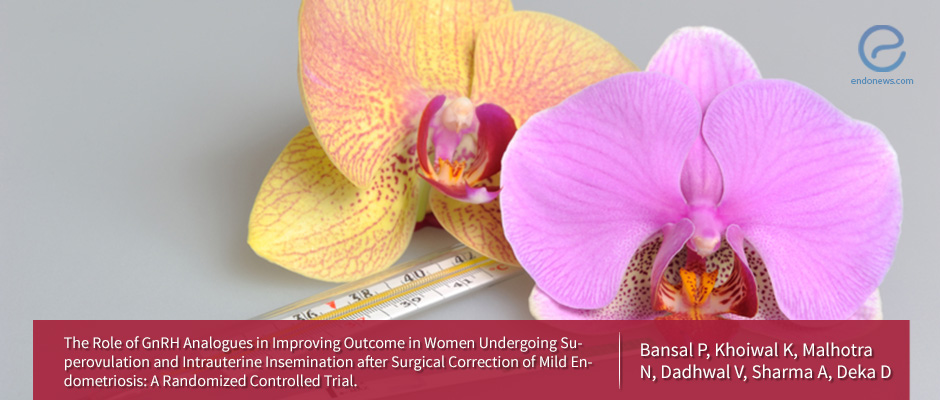GnRH Analogues Not Beneficial For Superovulation and Intrauterine Insemination
Aug 22, 2018
Surgically managed endometriosis patients who undergo superovulation and intrauterine insemination, may not reap many benefits from GnRH Analogues.
Key Points
Highlights:
- This paper focuses on women with mild endometriosis who are undergoing superovulation (SO) and intrauterine insemination (IUI) after they have been through surgery for their condition. The researchers wanted to see the effects of gonadotropin-releasing hormone analog (GnRHa) therapy on the outcomes for SO and IUI with regards to the aforementioned women.
Importance:
- Women suffering from endometriosis may have trouble conceiving. There is a need for treatments and therapies that will increase fertility and chances of conception in these women, thus that the disease does not greatly impede them from living the type of life they would be living otherwise.
What’s done here?
- Ninety women with mild endometriosis participated in the study, where the study group received GnRHa (3.75mg 0-48 hours after surgery), the control group did not.
- Both groups underwent SO and IUI at the start of their next menstrual cycle; Clomiphene citrate and urinary human menopausal gonadotropin (hMG) was used for ovarian stimulation
- Primary outcomes were live birth rates and clinical pregnancy rates; and the secondary outcomes were number of follicles >18 mm; endometrial thickness, the dosage and the days of the gonadotropin stimulation
Key results:
- The baseline characteristics were similar in both groups
- The SO and IUI cycles were similar for secondary outcomes in both the control and the study group
- The pregnancy rate for the first cycle was 17.1% for the study group and 19.1% for the controls, and the live birth rate was comparable to the clinical pregnancy rate.
- Overall pregnancy rate was 21.9% for the study group and 23.8% for the controls.
Limitations of the study:
- The authors list the sample size as a potential limitation of the study.
Lay Summary
Bansal et al, a group of authors from the All India Institute of Medical Sciences, recently published a paper titled “The Role of GnRH Analogues in Improving Outcome in Women Undergoing Superovulation and Intrauterine Insemination after Surgical Correction of Mild Endometriosis: A Randomized Controlled Trial” in The Eurasian Journal of Medicine. The paper wanted to look at the effects of gonadotropin-releasing hormone analog (GnRHa) therapy in women with surgically treated endometriosis who undergo superovulation (SO) and intrauterine insemination (IUI) for more positive results with conception.
Ninety women with mild endometriosis were included in the study and these patients were split into two groups, a study group as well as a control group. All of these women underwent surgical treatment for endometriosis. The women in the study group were given GnRHa 0-48 hours after their surgery, whereas the women in the control group were not given GnRHa. At the start of their next menstrual cycle, all patients were given SO and IUI. The researchers wanted to measure the following primary outcomes: live birth rates and clinical pregnancy rate. The secondary outcomes of interest in this study were endometrial thickness, days of gonadotropin stimulation and associated dose, and the number of follicles that exceeded 18 mm.
The baseline characteristics, as well as the SO and IUI cycles for the secondary outcomes, were similar in both groups. The first cycle pregnancy rate was lower in the study group, whereas the overall pregnancy rate was comparable between the two groups. The live birth rate and the clinical pregnancy rate were similar.
"Postoperative GnRHa is not effective in women with mild endometriosis in improving fertility outcome. Although GnRHa may be equally effective as surgery, it delays resumption of menstrual cycles, impeding the chances of pregnancy, besides adding to the cost of therapy" concluded researchers.
Research Source: https://www.ncbi.nlm.nih.gov/pubmed/30002577
Superovulation Intrauterine Insemination gonadotropin-releasing hormone analog fertility pregnancy conception Clomiphene citrate human menopausal gonadotropin

